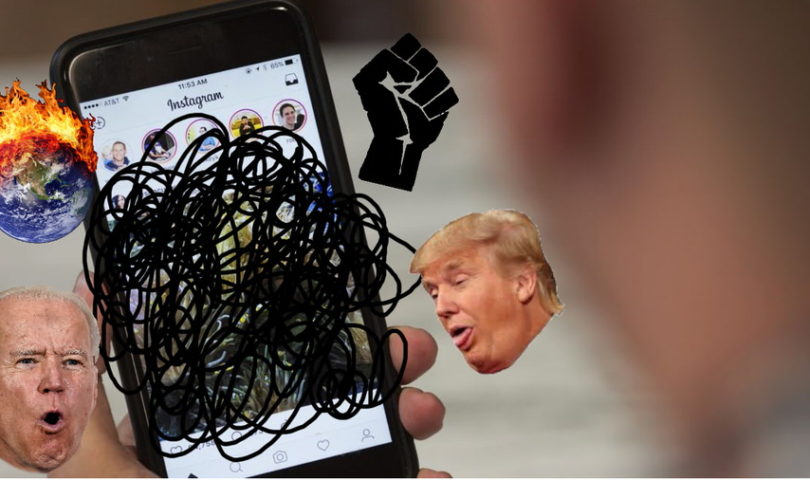A familiar foe in the busy schedule of a high school student: sweet, sweet time to zone out on Instagram. The home page is flooded with hundreds of stories to choose from; each scroll seems more enticing than the next. As you descend down, down, down the posts and wade through the sticky swamp of stories, exhaustion seems to overcome your initial desire for quick dopamine. Immigrant children are being trafficked, transgender people and BIPOC constantly subject to murder, imprisonment and “missing” cases. Oh, and the entire planet is still on fire. What to do? Should you repost? Leave a heartfelt comment? Grieve shortly and quietly block what you just saw out of your head?
With the recent, meteoric rise of social media activism, it has become increasingly easier to get overwhelmed with so much bad news. As fear runs rampant, so does inaction: and this is the exact opposite of what we should be trying to promote.
These kinds of posts are “a way of managing anxiety for those who are feeling deeply anxious,” Renee Lertzman, a climate-change communication psychologist, told the Atlantic in August 2017. “When we’re anxious and we’re scared, we want others to feel it too. It’s contagious.”
Many activists feel the need to share everything about their cause despite any unseen mental health consequences, such as activist burnout. As they continue to consume and spread more bad news, depression and brain fog wear further away at their health, sustainability, efficiency and effectiveness of their movements take a toll, according to a study by George Mason University.
You may even feel like you have to prove yourself to your following—that you care about everything there is, and the fastest way to express that is through a quick share. But sharing more than you can actually digest detracts from the causes that are most important to you, and weakens any possible, sincere interactions with your audience.
Those privileged enough to engage in performative activism usually do so in a relentless attempt to impress everyone with their utterly inspiring social media heroism. So if this sounds like you, ask yourself, truly ask yourself: are you doing it for you? Or are you under some sort of invisible social pressure to seem involved?
Fear-mongering and information overload is most definitely not the way to get people out of their comfort zone. So, how should we actually take action? First and foremost, you should pause your scrolling and absorb any information you’ve learned so far—continuing to consume may lead to more and more burnout. Grasp the issues you care about by looking at them in more detail, with an incredibly sharp focus on possible solutions. For example, causes usually don’t stop at petitions; if an organization is trustworthy and accepts donations, can you monetize any of your talents to raise money for it?
Most importantly, you must remember that none of this has to be done alone. Activism is never about you; it’s about fighting for a better community, nation, world. It is imperative for us to emphasize a group/relationship-based approach, acknowledging and normalizing any panicked feelings people may have by including them in your post. Instead of “sign this petition to get justice for Chinedu Okobi, wrongfully murdered by SMPD,” try “Chinedu Okobi’s death was an absolute tragedy, and it’s okay to feel outraged. There’s a SM Town Hall over Zoom that we can attend to advocate against this disgusting crime and push for better preventative measures. Are you in?”. The latter gives your followers an action to take and reassures them that they won’t be alone in doing so.
Take this laser-focused approach towards the few causes that mean the most to you and cultivate as much group action around it as you possibly can. We can certainly do this if we switch up our approach and work together—power in numbers!

